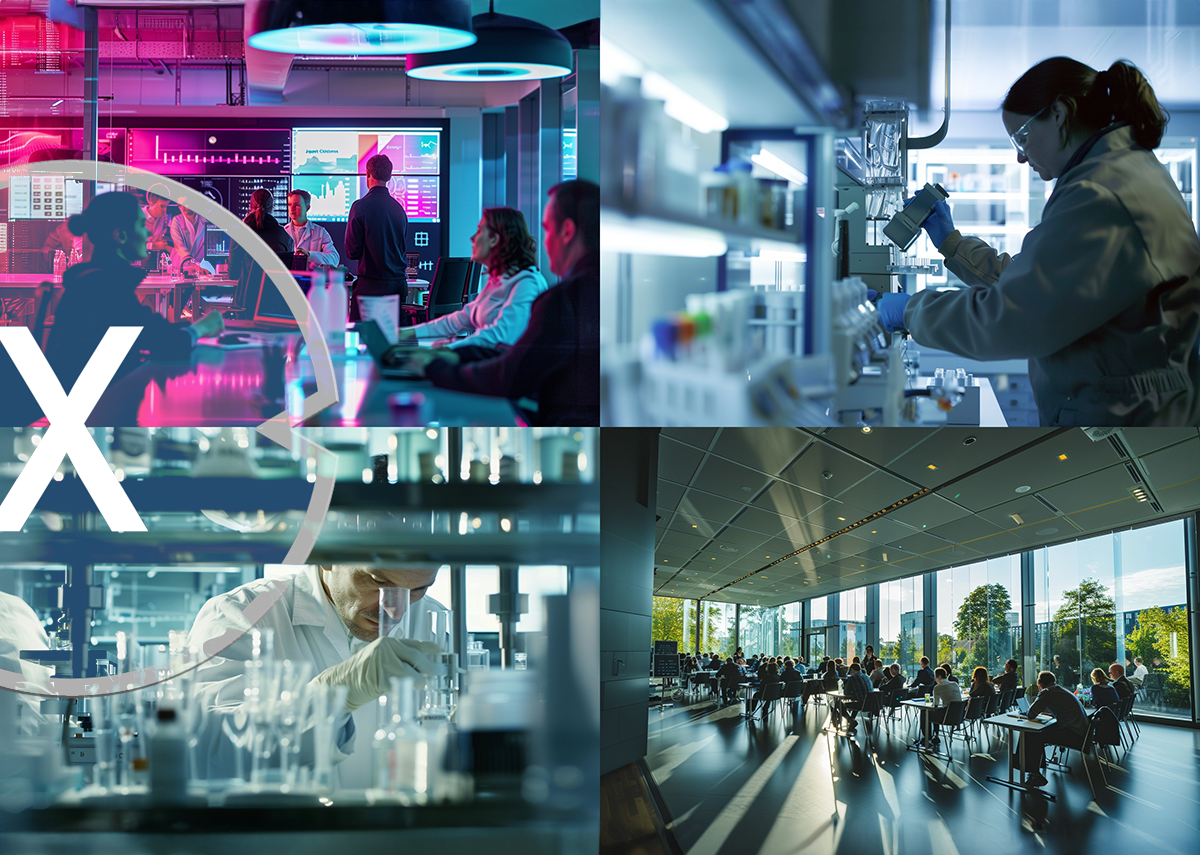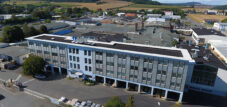The biotech or biopharma cluster in southern Germany based in Ulm is both a success story and a hidden champion at the same time
Language selection 📢
Published on: June 21, 2024 / update from: June 22, 2024 - Author: Konrad Wolfenstein

Synergies between the biotechnology and pharmaceutical industry and mechanical engineering from the development of advanced production facilities and automated small partial bearings (AKL) via specialized laboratory equipment- Image: Xpert.digital
🌿 The Biopharma cluster in southern Germany: a center for innovation and progress
🌟 Southern Germany positions itself as one of the most dynamic and future-oriented biopharmaceutical clusters in Europe. The region, which is characterized by its innovative strength and scientific excellence, has established itself for a hotspot for biopharmaceutical developments. Few other places offer such a concentration of scientific research institutions, specialized companies and highly qualified specialists.
📍 geographical distribution and infrastructure
The Biopharma cluster in southern Germany, more precisely: Biopharma Cluster South Germany EV, is characterized by a dense concentration of companies, research institutions and supporting institutions. The prominent companies include Boehringer Ingelheim Pharma GmbH & Co. KG, Rentschler Biopharma, Sartorius, Teva Biotech and Vetter Pharma International GmbH.
This region benefits from a robust educational and research infrastructure, including the Chamber of Commerce and Industry (IHK) Ulm, the Biberach University of Applied Sciences and the University of Ulm. In Biberach, the Fraunhofer Institute for interface and bio-procedural technology IGB is also present, which develops innovative solutions in biotechnology and process technology.
Furthermore, companies such as ECOSPECS GmbH that specializes in engineering services for quality systems, prospitalia GmbH, an important shopping service provider in the healthcare system, and clean room technology, which offers cleaning -technical solutions for the pharmaceutical industry, are represented in the cluster. Südpack Medica AG offers specialized services for medical sterile goods packaging.
The cluster's municipal partners include the Alb-Donau district, the Biberach district, the district of Neu-Ulm and the cities of Biberach, Ehingen (Donau), Laupheim, Neu-Ulm and Ulm. Financial support is provided by the Kreissparkasse Biberach and Volksbank Ulm-Biberach eG. Other supporting partners are the Ulm innovation region and the ITZ Plus Biberach, which serves as an innovation and technology transfer center.
The excellent transport infrastructure with highways and well -developed public transport as well as international airports nearby ensures excellent access and networking in the region. This infrastructure contributes significantly to the attractiveness and efficiency of the Biopharma cluster southern Germany.
📚 Scientific excellence and research competence
Some of the leading biopharmaceutical research institutes are located in southern Germany. These institutions work at the head of science and offer a variety of specialized programs that focus on the development of new therapies and medication. Areas such as genetics, cell therapy and personalized medicine are the focus of research.
The universities and research institutes of the region cooperate closely with industry. These partnerships promote the quick transfer of research results into marketable products.
🎓 highly qualified specialists and training
A strength of the Biopharma cluster southern Germany is the high density of highly qualified specialists. The region attracts talented scientists and engineers from all over the world. Last but not least, this is thanks to the quality of the training programs and the attractiveness of jobs in research institutions and industrial companies.
Universities offer specialized courses in biosciences, biotechnology and pharmacy. In addition, there are numerous further training programs that ensure that the specialists always remain up to date with research and technology. This ongoing educational process helps to maintain and expand the cluster's innovative strength.
🚀 Company and start-ups
The region houses a large number of globally operating companies. Large pharmaceutical companies such as Boehringer Ingelheim or Teva have significant branches in the region. These companies invest considerable funds in research and development and thus make a significant contribution to the cluster's innovative strength.
At the same time, there is a dynamic start-up scene that is favored by the proximity to universities and research institutes. Many of these young companies deal with disruptive technologies. Incubators and accelerator programs support these start-ups in the implementation of their business models and offer access to networking and capital.
🤝 Funding measures and network structures
Success is also due to targeted support measures and network structures. National and nationwide programs support research and the development of new technologies financially. These funding allow companies to take high risks and pursue ambitious projects that may not be realized without this support.
In addition, cluster initiatives and network organizations create synergies between companies, research institutions and political actors. These networks promote the exchange of knowledge and resources and support cooperation across disciplines and sectors. Events such as conferences, workshops and trade fairs offer regular opportunities for the exchange and networking of the actors.
🌱 sustainability and ethical aspects
Sustainability is an increasingly important aspect of the Biopharma industry. The biopharm in general deals with the question of how biopharmaceutical research and production can be made more environmentally friendly. This ranges from the reduction of resource consumption to minimizing waste to the development of sustainable production processes.
In addition, ethical aspects occupy a central place. The region relies on transparent research processes and responsible development and use of new technologies. The dialogue with the public and the consideration of ethical questions help to strengthen trust in biopharmaceutical products.
🔍 Continuous further development of technologies
The Biopharma cluster in southern Germany faces a promising future. The continuous further development of technologies, the high level of scientific research and the strong industrial basis offer a solid basis for future success.
Nevertheless, there are challenges that have to be mastered. The shortage of skilled workers in certain areas, the high costs for research and development as well as regulatory hurdles represent ongoing challenges. In addition, the increasing internationalization of the market requires constant adaptation and further development of the strategies and structures.
The Biopharma cluster in southern Germany occupies an outstanding position in the global biopharmaceutical market. With its unique combination of scientific excellence, highly qualified specialists and dynamic corporate landscape, the region sets standards for innovation and progress in the biopharm industry. The ongoing support of funding programs and the close networking of the actors will ensure that Southern Germany will continue to be at the forefront of biopharmaceutical development.
📣 Similar topics
- 💉 Southern Germany: Hotspot of Biopharma innovation
- 🚄 Transport infrastructure in the Biopharma cluster southern Germany
- 🔬 Scientific excellence: Research in southern Germany
- 🎓 Highly qualified specialists for the biopharma industry
- 🚀 Companies and start-ups drive the biopharma revolution ahead
- 🌍 Funding measures strengthen the Biopharma cluster southern Germany
- ♻️ Sustainability in the Biopharma Cluster: A green future
- 📊 Network structures and cluster initiatives: a success strategy
- 💡 Innovative technologies in the Biopharma cluster of southern Germany
- 🧬 Personalized medicine: a future area in the Biopharma cluster
#️⃣ hashtags: #biopharmacluster #innovationkraft #forschung #sustainability #personalized medicine
🧬🌟 Biopharma cluster South Germany: Pioneers of the innovation and market leader of the 'Hidden Champions'
🌍✨ Biopharma cluster South Germany: innovative strength and global networking
The Biopharma Cluster South Germany is definitely a success story thanks to its innovative strength, economic importance and global networking. Individual companies and institutes within the cluster can be viewed as “hidden champions” because they are leaders in their special areas:
🎯 innovative strength
The cluster is known for its high innovative strength in the Biopharma industry. It regularly produces new technologies, therapies and medication that are observed worldwide.
🤝 Cooperation and network
The close cooperation between universities, research institutions and companies promotes the exchange of knowledge and accelerates the market launch of new products.
💼 Economic importance
The cluster contributes significantly to the regional economy, creates high -quality jobs and attracts international investments.
🌐 worldwide recognition
Many institutes and companies in the cluster enjoy international recognition and play an important role in global research networks.
🏅 hidden champion:
A “hidden champion” is typically a medium -sized company that takes on a leading position on the world market in its specialty, but is relatively unknown to the general public. The Biopharma Cluster South Germany as a whole does not fit perfectly into this definition, but some of its member companies and institutes very well:
🔬 specialized companies
The cluster is home to several specialized companies that are leadership in their niche and sometimes not very well known worldwide market leaders, but not very well known outside of their specialist areas.
🏢 research institutions
Some research institutions in this cluster are leaders worldwide in specific areas of biopharmaceutical research, but not necessarily generally known.
📣 Similar topics
- 📣 Innovative strength drives Biopharma Cluster ahead
- 🚀 Cooperation in the Biopharma sector as a success key
- 💼 Economic importance of a biopharma cluster
- 🌍 Global network thickness of the biopharma cluster
- 🔬 Research Exellence in the Biopharma area
- 🏆 International recognition for Biopharma Cluster
- 🔍 hidden champions of the biopharmace
- 📈 Economic development by Biopharma Cluster
- 🧬 New technologies from the Biopharma Cluster
- 💡 Exchange of knowledge and innovation in the biopharma sector
#️⃣ hashtags: #innovation force #wirtschaftlichlichlichlichlichlichlichlicheinutung #globalenverzung #hiddenchampions #biopharmaf research
Our recommendation: 🌍 Limitless reach 🔗 Networked 🌐 Multilingual 💪 Strong sales: 💡 Authentic with strategy 🚀 Innovation meets 🧠 Intuition
At a time when a company's digital presence determines its success, the challenge is how to make this presence authentic, individual and far-reaching. Xpert.Digital offers an innovative solution that positions itself as an intersection between an industry hub, a blog and a brand ambassador. It combines the advantages of communication and sales channels in a single platform and enables publication in 18 different languages. The cooperation with partner portals and the possibility of publishing articles on Google News and a press distribution list with around 8,000 journalists and readers maximize the reach and visibility of the content. This represents an essential factor in external sales & marketing (SMarketing).
More about it here:
📌 Other suitable topics
❄️🏪 From production location to cooling logistics: the diverse synergies of biotechnology, pharmaceutical and mechanical engineering
🔬🧪 The interfaces between the biotechnology and pharmaceutical industry on the one hand and mechanical engineering on the other hand open a wide field of synergies. These range from the development of advanced production facilities to specialized laboratory equipment to medical devices. Particularly noteworthy are the areas of the automated small part warehouse (AKL) and cooling logistics, which offer numerous productive cooperation opportunities. These synergies are not only economically valuable, but also make a significant contribution to guaranteeing health services at the highest level and promoting scientific research.
🧫 Development of production systems
In the highly regulated biotechnology and pharmaceutical industry, advanced production facilities are essential to manufacture medication and biotechnological products safely and efficiently. Mechanical engineering is of central importance, since it provides the technological expertise and innovative strength that is necessary for tailor -made solutions. Without mechanical engineering, specialized systems that automate biological processes or ensure sterile production conditions would hardly be feasible. This cooperation leads to flexible production facilities that can react efficiently to new challenges and adhere to the highest security standards.
🔬 specialized laboratory equipment
Research and development in biotechnology and pharmacy are dependent on highly precise laboratory equipment. Here, too, the close cooperation between the industries is evident, since mechanical engineering develops complex devices such as spectrometers, chromatographers or automated pipetting robots. Such instruments must meet the highest demands on precision, reliability and user -friendliness in order to ensure precise analyzes and processing of biological samples. Thanks to the latest mechanical engineering technology, laboratories can work faster and more precisely and automate complex methods, which significantly accelerates research.
🩺 medical devices
The production of medical devices is another example of the successful cooperation of biotechnology, pharmaceutical industry and mechanical engineering. From diagnostic devices to implantable devices to devices for minimally invasive surgery - mechanical engineering provides the necessary technical solutions for innovations in medical technology. Interdisciplinary cooperation is particularly important here, since the medical requirements and technical feasibility have to be reconciled. This is the only way to develop devices that make medical interventions more secure, less invasive and more effective.
🏪 Automated small part warehouse (AKL)
In the area of logistics, automated small part warehouse (AKL) plays an important role, especially in the storage of pharmaceutical products. These camps enable efficient, automated storage and picking of small to medium -sized articles, which is of crucial importance in the pharmaceutical industry. Thanks to the precision work of the mechanical engineering, AKLs can be designed in such a way that they offer optimal storage conditions, use the space efficiently and ensure the safety and traceability of the products. Promising developments in this area show how the integration of mechanical engineering innovations can significantly increase efficiency in pharmaceutical logistics.
Suitable for:
- Automated Miniload System (AMS / MLS) – Automatic small parts warehouse (AKL)
- Our new top ten overview of manufacturers and companies/providers for automatic small parts storage | AKL storage systems
❄️ Cool logistics
Cooling logistics are of extremely important for biotechnology and pharmaceutical industry, since many biological products and medication have to be continuously cooled. Here, too, mechanical engineering plays a crucial role in the development of cooling devices and systems that ensure an uninterrupted cold chain. These systems must offer precise temperature controls and be robust and reliable in order to meet the requirements of the often complex transport routes. The use of data -based monitoring systems is becoming increasingly important in order to ensure the integrity of the products across the entire supply chain and thus ensure the highest quality.
Suitable for:
🤝 Interdisciplinary cooperation and future developments
The symbiotic relationship between biotechnology, pharmaceutical industry and mechanical engineering impressively shows how interdisciplinary collaborations can lead to expanding the possible technical limits. This cooperation creates innovations that benefit the entire society. The importance of these synergies will continue to increase in the future, since the challenges in medicine become more complex and the requirements for precision, security and efficiency continue to increase.
The close cooperation in the development and optimization of production and analysis devices has a special potential, which are becoming increasingly efficient and more user-friendly due to progressive technology. A specific example of this is biotechnological production systems that are increasingly relying on automation and flexibility in order to meet the changing requirements of the market. In the case of medical devices, the integration of new technologies such as artificial intelligence and mechanical learning will also lead to considerable progress.
In addition, improving cooling logistics will continue to be a central topic by using innovative materials and smart technologies. Advances in areas such as sensors and data evaluation will make it possible to monitor and control the cooling chain even more precisely and more effectively. This is particularly important with regard to the increasingly globalized drug supply.
Ultimately, this close link of the disciplines also reflects the change that the industry goes through as a whole. The increasing digitization and the rapid technological development require flexible and adaptable solutions that can only be realized through close cooperation from a wide range of departments. The common use of knowledge and technologies not only leads to more efficient production and logistics processes, but also enables the development of new therapies and diagnostic options that benefit the patient.
Overall, the ongoing close cooperation between biotechnology, the pharmaceutical industry and mechanical engineering offers huge opportunities to raise medical research and care to a new level. Such interdisciplinary approaches are the key to meet the constantly growing demands of modern medicine and at the same time make economic and scientific progress.
📣 Similar topics
- 🔬🧪 synergies between biotechnology, pharmaceutical and mechanical engineering: new horizons for medicine
- 🧫🏭 Innovative strength through cooperation: biotechnology, pharmaceutical and mechanical engineering in dialogue
- 🩺🔍 synergies in medical technology: the role of interdisciplinary collaborations
- ❄️🚚 Cooling logistics and machine technology: a cooperation for sensitive medicines
- 🤝🔬 Biotechnology meets mechanical engineering: Common developments for efficient production systems
- 🧪💉 Precision and technology: medical devices through interdisciplinary innovations
- 🔧🔬 mechanical engineering and life: progress in specialized laboratory equipment
- 📦🤖 Effective warehouse solutions: automated small parts warehouse in the pharmaceutical area
- 🌡️📊 Advanced sensors: temperature monitoring in pharmaceutical cooling logistics
- 💡🌍 Future prospects through synergies: developments in biotechnology, pharmaceutical and mechanical engineering
#️⃣ Hashtags: #Biotechnology #Pharma #Maschinenbau #Medicine Technology #Interdisciplinary_ Corporation
🧬💊 The fine difference: Biotech vs. Biopharma in focus
🔬🔎 There is a difference between biotech and biopharm, although the two terms are often closely connected and can be used in some contexts. The main difference is in its area of application and its focus.
🧬 Biotech
🔬 Biotechnology (biotech) refers to the use of biological systems, organisms or derivatives for the production or modification of products or processes for various purposes. Biotech includes a wide range of applications in various industries, including agriculture, food production, environmental sciences and medicine.
Biotechnological companies can be involved in research and development (F&E) in areas such as genetic engineering, proteomics, metabolomics and cell therapy. While the focus is often on medical applications, many biotech companies also work in other areas such as the development of bio-based chemicals, bioenergy or seed modification.
💊 Biopharma
🧪 Biopharmaca or biopharm refers specifically to the part of biotechnology, which focuses on the development, production and distribution of medicines and therapies that come from living organisms or their cell components. These include, for example, monoclonal antibodies, recombinant proteins, vaccines, cell therapies and genetic therapies.
Biopharmaceutical companies focus on the discovery of new medication, clinical development, regulatory approval and finally the marketing of therapies for diseases. The sector is heavily regulated, with an intensive review by authorities such as the US Food and Drug Administration (FDA) or the European Medicines Agency (EMA).
🔄 Biotech and Biopharma
- 🧬 Biotech is a broad term that relates to the use of technologies in living systems for the development of products or processes in a variety of industries.
- 💊 Biopharma is a specialized area within biotechnology that deals exclusively with the development and production of biological medication and therapies.
Although the boundaries between these areas can overlap, the distinction is helpful to understand the specific focus and scope of companies and research institutions.
We are there for you - advice - planning - implementation - project management
☑️ SME support in strategy, consulting, planning and implementation
☑️ Creation or realignment of the digital strategy and digitalization
☑️ Expansion and optimization of international sales processes
☑️ Global & Digital B2B trading platforms
☑️ Pioneer Business Development
I would be happy to serve as your personal advisor.
You can contact me by filling out the contact form below or simply call me on +49 89 89 674 804 (Munich) .
I'm looking forward to our joint project.
Xpert.Digital - Konrad Wolfenstein
Xpert.Digital is a hub for industry with a focus on digitalization, mechanical engineering, logistics/intralogistics and photovoltaics.
With our 360° business development solution, we support well-known companies from new business to after sales.
Market intelligence, smarketing, marketing automation, content development, PR, mail campaigns, personalized social media and lead nurturing are part of our digital tools.
You can find out more at: www.xpert.digital - www.xpert.solar - www.xpert.plus
































